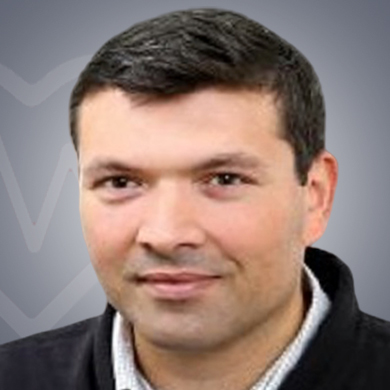
20 Years of experience
Speaks: English
Dr. Moshe Attia is a distinguished neurosurgeon working at the Sheba Medical Center, Tel Hashomer, Israel. He has over 20 years of experience in his field and has done extensive work in the field of neurosurgery as well. He obtained his medical education from the Hadassah School of Medicine, the Hebrew University of Jerusalem. He went on to pursue an Internship in Neurosurgery, Department of Neurosurgery, Sheba Medical Center. He specializes in surgery of the skull base tumors, cerebral meningioma, endoscopic transsphenoidal surgery, acoustic neuroma, vestibular schwannoma, and cerebral cavernoma.
Dr. Moshe Attia has been a part of many different research papers published in many international medical journals. He is also the Director, Skull Base Surgery Service. Dr. Moshe is also a Member of the Israel Medical Association, Member of the Israeli Association of Neurosurgery, and Member of the North American Skull Base Surgery Association. Many of his publications are also available on Pubmed.
A neurosurgeon is a doctor who specializes in the diagnosis as well as surgical treatment of conditions of the central and peripheral nervous system, such as congenital anomalies, infections of the brain or spine, stroke, trauma, tumors, vascular disorders, or degenerative diseases of the spine. Here is a list of some of the conditions Dr. Moshe Attia treats:
Some of the signs and symptoms that neurological disorders can produce are listed below. These symptoms should be discussed with a neurosurgeon for further medical investigation.
Neurological disorders can cause mixed symptoms, such as difficulties in moving, speaking, learning, swallowing, breathing. According to brain specialists, there are more than 600 neurologic diseases that cause mild to severe symptoms. Having a neurological disease could have a deep impact on the patient’s life. It is very important that a person should seek medical advice from a neurologist.
The working hour of doctor Moshe Attia is 11 am to 5 pm from Monday to Saturday. The doctor has an off on Sunday. Sometimes, the doctor may not be available on the working days, so it is always suggested that you confirm the doctor’s availability before you visit him.
Some of the popular procedures that Dr Moshe Attia perform are given below::
With a rich experience in neurosurgery and having a record for performing a number of successful brain surgeries with a high success rate, the neurosurgeon has received global recognition for their holistic approach. Patient safety is the top priority for the doctor who follows all medical protocols and provides care of international standards. Also, the doctor can handle even the most complicated cases with ease.

Share Your Experience about Dr. Moshe Attia

Dr. Moshe has over 13 years of experience in his field.
He specializes in surgery of the skull base tumors, cerebral meningioma, endoscopic transsphenoidal surgery, acoustic neuroma, vestibular schwannoma, and cerebral cavernoma.
Yes, Dr. Moshe Attia provides online consultation through MediGence.
He is a part of the Israel Medical Association, the Israeli Association of Neurosurgery, and a member of the North American Skull Base Surgery Association.
Neurosurgeons are trained physicians who can operate and conduct procedures on the brain and other nervous system parts to help cure different diseases. They are also experts on the diagnosis and treatment of neurologic disorders.
He can be easily consulted by registering your profile with medigence and writing down your inquiry. A meeting with the surgeon will be scheduled. Following which the consultation can be done.
Neurosurgeons, also known as brain surgeons, are doctors who specialize in the surgical treatment of conditions that affect the nervous system, brain, and spine. Neurosurgeons first have the training which makes them eligible to practise as a doctor. After this, they complete specialist training in neurosurgery. Neurosurgeons are regarded as highly trained specialists who perform some of the most critical surgeries on the brain and spine. The nervous system being the most complicated part of the body needs great precision and accuracy while performing surgery. Neurosurgeons also may also consult other specialists and medical professionals as per the requirement of surgery.
A neurosurgeon will recommend you one or more diagnostic tests before and during consultation in order to find out the case of the condition and start the right treatment. For a complete evaluation of your condition, you have to undergo neurological examination which may include the following:
The below-listed are some of the diagnostic tests recommended by a neurosurgeon to diagnose a condition of the nervous system::
You need to visit a neurosurgeon if you show any of the following signs:
Neurosurgeons help in the diagnosis and treatment of the conditions of the nervous system. They are mostly involved in complicated surgery of the brain. They offer surgical treatment for the conditions affecting any part of the body, caused mainly due to nerve issues.